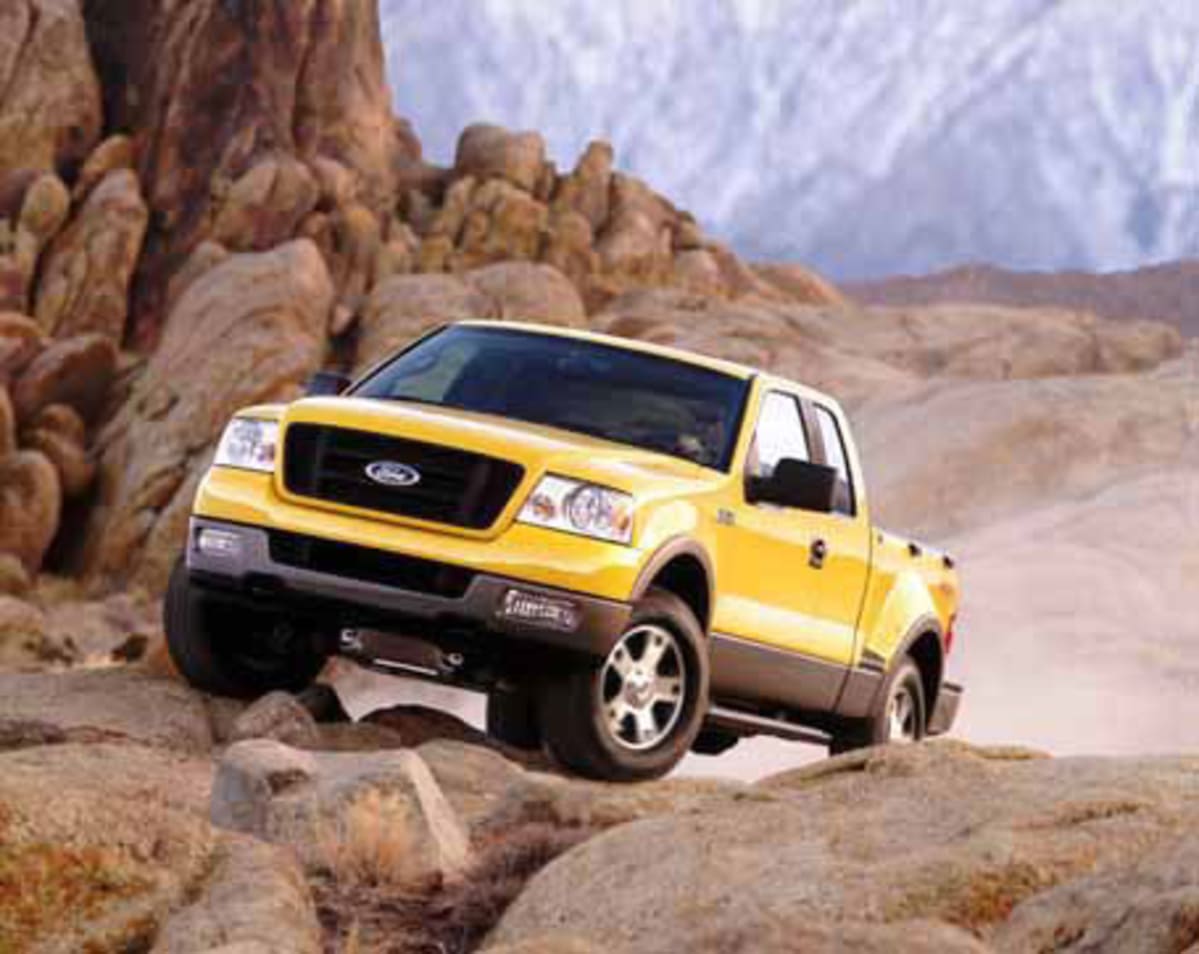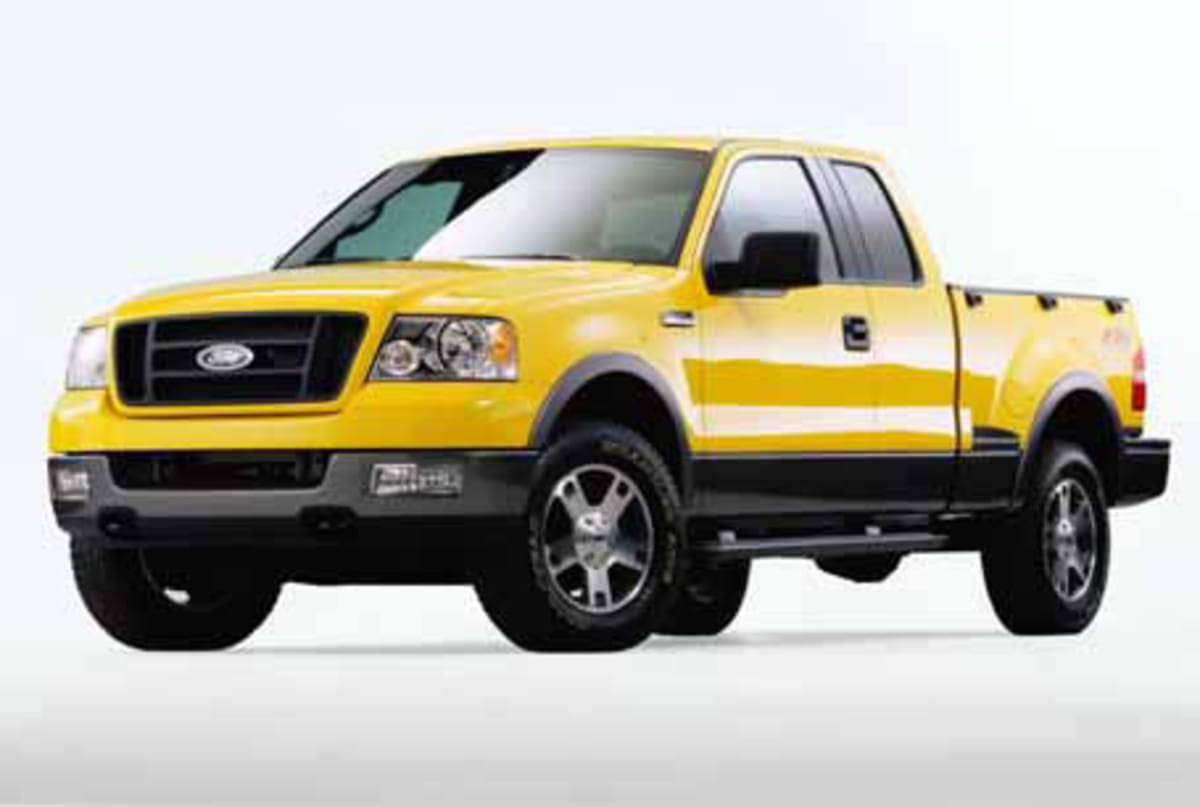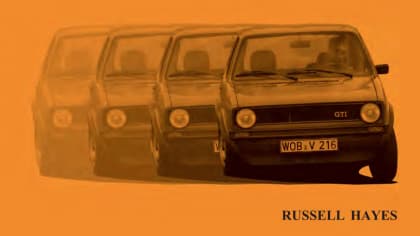HOORAY FOR HOLLYWOOD
This article is from our archives and has not been updated and integrated with our "new" site yet... Even so, it's still awesome - so keep reading!
Published on Fri, May 23, 2003
By: The LACar Editorial Staff
HOORAY FOR HOLLYWOOD
By ZORAN SEGINA
The first noticeable thing about the new truck is its much bolder, kind of in-your-face
look. This look was achieved by widening the front and rear tracks more than
1.5 inches, opening the wheel wells to accommodate seventeen and even eighteen-inch
wheels, and rounding the tops with protective plastic covers. In the front there
is a wrap-around fascia with quad-circle-styled headlamps, a large bumper containing
integrated fog lamps, two menacing tow-hooks complete the look. The truck is
and significantly more appealing than the existing F-150 series. A customer
can now choose different grille covers, and the one on the podium came with
an H-style black plastic one which seemed more appealing that the standard mesh
grille.
The passenger compartment on the yellow truck has four doors. The inside is
six inches longer than in the existing models. In the SuperCab configuration,
that extra length means increased rear-seat comfort for three adults in the
rear seat. For Regular Cab, it means a foot of secure storage space behind the
seat. If you want fancy, SuperCab occupants can order rear door power windows,
and even an optional power sliding rear window.
Today’s customer wants to customize, and Ford is willing to help. From
a basic 150 XL, the workhorse truck that gets the job done, and can be hosed-out
when dirty, to the upscale Lariat. Here, you can get heated dual power leather
captains chairs, brushed aluminum and steel floor shifter, wood-grain touches
on the doors and instrument panel center stack and cream-colored gauges ringed
in chrome to complement the chrome-ringed air registers and chrome door handles.
Lariat's steering wheel has built-in controls for key audio and climate control
functions. If this is not enough, go for an in-dash message center, electronic
automatic temperature control and power-adjustable memory seats and pedals.
You can add beige lower two-tone paint treatment, chrome bumpers and a unique
grille, along with 18-inch bright aluminum wheels.

The new F-150 has a modular overhead rail system that allows owners to customize
interior storage options to suit their individual needs. The brushed aluminum
rail system is integrated into the headliner and extends from behind the rearview
mirror to behind the second row of seats. The forward end of the rail features
a dome light console and a large storage bin module. The system, with integral
power supply, allows owners to easily snap in additional modules, such as first
aid kits, toolboxes, flashlights and two-way radio holders as they become available
from Ford or the aftermarket. On XLT, FX4 and Lariat SuperCrew one can get a
rear-seat DVD entertainment system.
Behind the four doors there is a cargo box that comes in three box lengths -
from five and a half to eight feet. The sidewalls are two inches higher, and
the cargo space has more eyelets for hooks than a fishing boat. A tailgate is
sturdy, but owing to a new standard Tailgate Assist feature - a spring system
inside the latch - can be opened and closed without effort.
At F-150's core is a boxed ladder frame with hydroformed front rails. Critical
cross members are welded to the rails with a through-rail joint to prevent localized
flex. Wide-footprint brackets attach the suspension, body and powertrain to
the frame to maximize the strength of the attachment point. Ford says that the
new body structure is improved by more than seventy five percent and works with
the stiffer frame to ward off squeaks and rattles. A front suspension system
uses coil-on-shock, long-spindle, double wishbone front suspension with cast
aluminum lower control arms to reduce unsprung weight. Engineers added double
ball-type joints instead of rubber bushings in the stabilizer bar system. The
front shock absorbers are mounted inside the springs, allowing four-wheel-drive
models to use coil springs instead of the traditional torsion bars. This design
also moves the shock absorber closer to the wheel, which allows for more precise
shock tuning.
The truck still comes with rear leaf springs, but on the new model they are
now three inches wide to help reduce sway during cornering and improve towing
stability. Ford engineers placed the rear shock absorbers outside the frame
rails. This should improve body lean and provide better control of axle skipping
when the road surface turns into a washboard. 
The recirculating-ball steering system used on the current F-150s was ditched
in favor of a rack-and-pinion. The truck can be stopped by 13 inch-twin-piston
caliper discs in the front and, now standard on all models, 13.7-inch single-piston
rear disc brakes.
The new F-150 offers two engine choices, a 4.6-liter or 5.4-liter, Triton V-8.
The smaller engine gets 231 horsepower at 4,750 rpm and 293 foot-pounds of torque
at 3,500 rpm. Ninety percent of this torque is available at 2,000 rpm for towing.
Those power-hungry types will choose 5.4-liter Triton pumping 300 horsepower
at 5,000 rpm and 365 foot-pounds of torque at 3,750 rpm. The new engine has
aluminum cylinder head ö with two intake valves and one exhaust valve per
cylinder. The transfer of power should be handled through a new 4R75E four-speed
automatic transmission, which, Ford says, has been upgraded to handle the torque
of the 5.4-liter engine. If this proves to be correct, Ford will have eliminated
what has been generally known as the weakest link in the F-series powertrain.
The maximum standard tow rating is 8,300 pounds, properly equipped, and the
maximum payload capacity is 2,000 pounds. The optional Payload Group upgrades
the Gross Vehicle Weight Rating to 8,200 pounds, raises the payload capacity
to 2,900 pounds and the towing capacity to 8,800 pounds.
Presentation is nearly over. Rick Fox has to go to practice, and wants to know
whether he can take the truck. He is told he’ll get one once it gets into
production. As Rick leaves the stage his shirt is ruffled by the wind. It is
getting warmer. We are ready to leave.
Meanwhile, two thousand miles east, in Detroit, it is thirty-six degrees Fahrenheit
outside the pavilions housing the North American International Auto Show. There
will be no outdoor presentations because no PR specialist would ever allow a
Pistons player to stand for quarter of an hour in Detroit in January dressed
only in shirt and slacks. They will have to unveil the new F-150 indoors. Later.
When it comes to world premieres, nobody beats Hollywood. 




